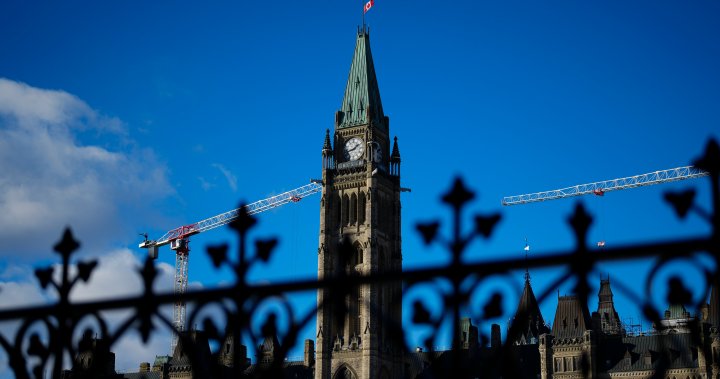The House of Commons rose on Friday until the end of January as a tumultuous year for the chamber comes to a close.
The House will sit again on Jan. 29, but major issues from 2023 will remain to be parsed through, including Canada’s affordability and housing crisis, and the hashing out of pharmacare.
That’s not to mention rising tensions between the ruling Liberals and the opposition Conservatives, including a filibuster from the latter that had MPs staying late into the night earlier in the month with about 20,000 amendments introduced to legislation.
Polling, including surveys by Ipsos done exclusively for Global News, has shown the Liberals flagging, with three-quarters of respondents telling Ipsos last month they feel Prime Minister Justin Trudeau should step down now.
Ipsos’ poll found that if an election were held at that time, 40 per cent would vote Conservative, 24 per cent would vote Liberal and 21 per cent would vote NDP. Other polls throughout the fall suggested similar sentiments among Canadians.
Liberal figures, including Trudeau, have shifted their messages to warn of what they describe as a growing trend in MAGA-style politics from the Conservatives and party leader Pierre Poilievre.
House leader Karina Gould said Thursday that Poilievre is “hell-bent on bringing American-style extreme right-wing politics that have created chaos and dysfunction in Washington to Canada.”
“Instead of entertaining his little temper tantrum, I’m going to suggest that he takes a little bit of time out,” she said, hinting at the upcoming break for the politicians.

The Conservatives voted on Friday against the motion for the House to rise. In a statement Friday prior to the vote, the party said it “fought hard to turn the hurt Trudeau caused into the hope Canadians desperately need.”
“Since September, common sense Conservatives have been working nonstop to force the Liberals to axe the tax and stop putting more fuel on the inflationary fire with their reckless spending and deficits,” the statement read.
The government will return in the new year faced with a growing affordability and housing crisis in the country.
A Bank of Canada index showed earlier in the week that housing affordability was at the worst levels in 41 years in the last quarter. The Bank of Canada’s housing affordability index tracks Canadians’ typical mortgage payments and utility costs as a proportion of their income.
BMO chief economist Doug Porter said in a note to clients on Wednesday morning that the growth in long-term interest rates over the summer and early fall, along with a rise in home prices, made a “double-whammy” to homeowners and buyers.
A National Bank of Canada report from last month also pointed to a “significant deterioration” in housing affordability last quarter.
Canadians also continue to deal with inflation, and it appears efforts from the government to ease some burdens, such as the cost of groceries, may not be helping.
A “grocers code of conduct” for major grocers in the country stalled earlier in the week due to a lack of support from Walmart and Loblaw, who say that the code may actually raise prices rather than lower them. Nevertheless, Innovation Minister Francois-Philippe Champagne said the code will move forward — whether the grocers like it or not, and to expect it in 2024.

Canadians can also expect the introduction of pharmacare legislation, which had its deadline moved from the end of the year to March 1, the Liberals and NDP announced on Thursday. The legislation is part of a supply-and-confidence deal between the two parties — however, they have yet to agree on what a framework should look like.
The New Democrats rejected a draft of the bill earlier this year and insisted on a universal, single-payer program. But Health Minister Mark Holland has repeatedly said plans for the program will reflect the need to be fiscally responsible.
Last month, the NDP said if the Liberals missed the end-of-year deadline set out in the initial agreement, they would be expecting more out of the deal.
The year also saw one House of Commons Speaker resign, only for his replacement to quickly find himself in hot water as well.
Speaker Antony Rota resigned after inviting a Second World War Ukrainian veteran who fought with a Nazi unit to the House and calling for praise. Rota’s replacement, Liberal MP Greg Fergus, has meanwhile apologized repeatedly for appearing in an Ontario Liberal Party video.
Fergus has been ordered to pay for the parliamentary resources used in the matter and gets to keep his job, though the Conservatives and Bloc Quebecois are still calling for his resignation.
— with files from Global News’ Craig Lord and The Canadian Press.

© 2023 Global News, a division of Corus Entertainment Inc.



